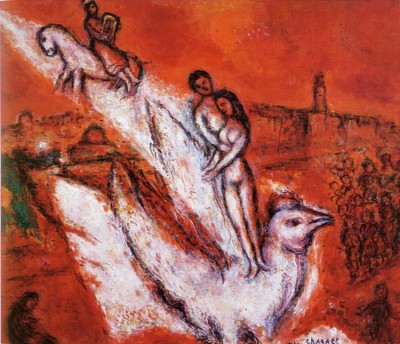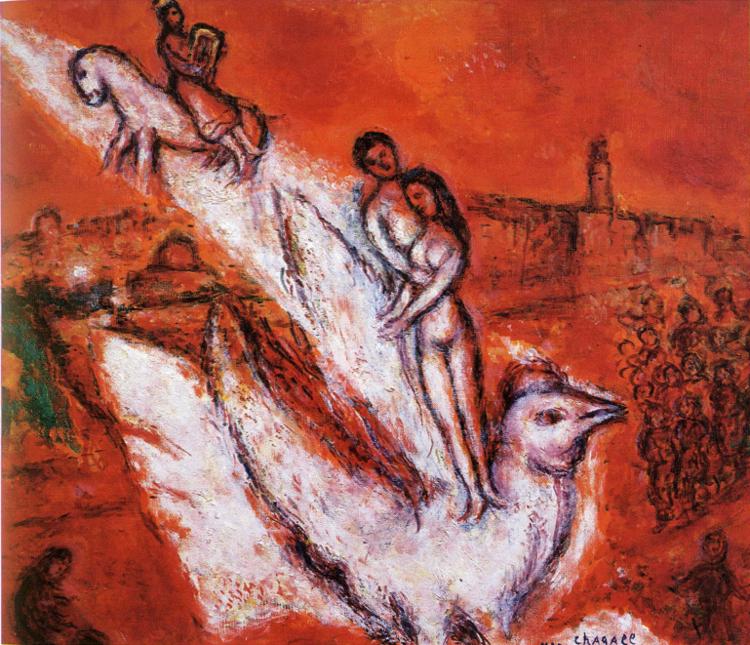
When I envision the rituals that will someday characterize my family’s Judaism, singing “Eishet Chayil“, or “A Woman of Valor” to my future wife is not among them. However beloved and time-worn a tradition the singing of this particular chapter of Proverbs is, it seems odd to me that I should strive so hard for equality and reciprocity in my relationships and yet maintain a custom that makes the opposite statement. The traditional procedure is familiar: around the Shabbat table, after greeting the guests and welcoming in the guardian angels by singing “Shalom Aleichem,” right before sanctifying the day with the Kiddush blessings, the male host pauses and serenades his spouse with this acrostic poem. She blushes and smiles, finally allowing the tranquility of Shabbat to wash over her, along with the feeling of being appreciated by her husband and family. Somehow she pulled it off again—the kids are showered, the food is ready, the table is set, and all that was accomplished with phone in hand, answering the last few work emails before turning off for the night. A true Proverbial Eishet Chayil.
If that fit the image of the household I want to co-build, I would have no issue with “Eishet Chayil.” Such a woman deserves to be venerated, and I, never one to be ungrateful, would sing her praises with all my heart. But I would have to ask myself: where was I when she was doing all this? Did I not cook or set up or email? Was I like the husband described by the text of “Eishet Chayil,” simply “sitting among the elders of the gate”? That’s not how my own parents modeled Shabbat prep for me growing up, and that’s not the dynamic I plan to establish in my future home, either. And if I truly were working as an equal partner alongside my wife to welcome in Shabbat, where’s my “Eishet Chayil”? Where’s my song of praise to which, as a member of an egalitarian household, I’m entitled?
Many families have tailored “Eishet Chayil” to fit their modern sensitivities, omitting certain verses that explicitly reference outdated gender roles. Some women even recite a parallel poem for their spouses (Psalm 112; “Happy is the man who fears the Lord”), and thus have customized the tradition by adding their own egalitarian response. I’m still not sure, however, that I like the images conjured up even by the parts deemed acceptable. I want to shift the paradigm away from merely lauding my spouse with words of appreciation, as if she were employee of the month and I, as the CEO of the company, toss a few nice words of recognition her way before the spotlight returns to me .
I want something that would truly reflect our relationship, that speaks to the deep emotional connection and sense of intimacy that I hope one day to find with someone. I want to infuse the entrance of Shabbat with the everlasting love of the Jewish people, and I feel it is therefore appropriate to draw on images and sensations that depict the love of the homemakers who welcome her in.
In order to keep the ritual grounded in traditional Jewish text, I turned to the best love poem of all time: The Song of Songs, or Shir HaShirim in Hebrew.
This is not a novel idea—the reading of the eight chapters of the Song of Songs is already a well-established custom in many Sephardic communities, usually done right before Kabbalat Shabbat. But when it’s read in many synagogues, the emphasis falls on the allegorical interpretation of the book, where the man represents God and his female companion is the Jewish people. I wish to highlight what many modern scholars—and even some passages in the Talmud—notice about Shir HaShirim: on the simplest level, it describes courtship between two human lovers, the ballads they sing to and about each other, and the escalation of their mutual longing until their love is realized. The narrative depicts a growing intimacy throughout the individual songs of the lovers, alluding to sights and tastes and smells, each metaphor swollen with affection and admiration. This book contains dialogue, reciprocity, and genuine love: all of them aspects of a strong relationship that I wish to celebrate around my Shabbat dinner table.
(In saying this, I fully acknowledge that single parent households and same-sex couples don’t fit the template presented by Shir HaShirim; I don’t intend to be discriminatory and would encourage each household to compose something appropriate for its own members.)
I exercised a bit of poetic license in arranging the verses, taking them out of their natural context and toying with the order of their appearance in the narrative. In order to create a dialogue of short call-and-response sentences, I wove individual verses together with ones of similar content and linguistic structures as if the next voice is reacting to the previous line and replying in turn. Skipping over the intense limb-by-limb descriptions found throughout Shir HaShirim and avoiding the scenes of frightened desperation, I preferred to focus on the general declarations of love and the lovers’ affectionate petitions to meet face to face. The composition is comprised of a few units, intended to resemble the natural progression of a relationship:
- Meeting (2:8-2:16)
- Courtship – intimate descriptions of the other, indicating attraction (1:15-4:7)
- Peak – Petitioning each other to actualize their love (1:2-2:14)
- General statement about love (8:6-7)
With this new paradigm for a song of genuine adoration and intimacy on Friday nights, I hope to usher in Shabbat in light of the mutual love shared by two people who have chosen to spend their Shabbatot—and the rest of their lives—together.
Song of Songs (JPS translation, click here for the original Hebrew.)
(Male voice in bold; female in standard font)
“Hark! My beloved! There he comes, leaping over mountains, bounding over hills.” (2:8)
“Who is she that shines through like the dawn, beautiful as the moon, radiant as the sun, awesome as bannered hosts? ” (6:10)
“Hark, my beloved knocks!”
“Let me in, my own, my darling, my faultless dove! (5:2)
Trip down from Amana’s peak, from the peak of Senir and Hermon; from the dens of lions, from the hills of leopards.” (4:8)
“I rose to let in my beloved. (5:5)
I held him fast, I would not let him go, until I brought him to my mother’s house, to the chamber of her who conceived me. (3:4)
His left hand was under my head, his right arm embraced me. (2:6)
My beloved is mine and I am his, who browses among the lilies.” (2:16)
“Ah, you are fair, my darling; Ah, you are fair, with your dove-like eyes!’ ”
“And you, my beloved, are handsome, beautiful indeed! Our couch is in a bower.’ ” (1:15-16)
“Like a lily among thorns, so is my darling among the maidens.”
“Like an apple tree among trees of the forest, so is my beloved among the youths. I delight to sit in his shade and his fruit is sweet to my mouth.” (2:2-3)
“You have captured my heart, my own, my bride, with one [glance] of your eyes, with one coil of your necklace.” (4:9)
“How is your beloved better than another, O fairest of women? How is your beloved better than another, that you adjure us so?”
“My beloved is clear-skinned and ruddy, pre-eminent among ten thousand.
His eyes are like doves by watercourses.
He is majestic as Lebanon; stately as the cedars.
His mouth is delicious and all of him is delightful. Such is my beloved, such is my darling, O maidens of Jerusalem!” (5:9-10,12,15-16)
“My beloved spoke thus to me:” (2:10)
“Only one is my dove, my perfect one, the only one of her mother, the delight of her who bore her. Maidens see and acclaim her; queens and concubines, and praise her. (6:9)
Sweetness drips from your lips, O bride; Honey and milk are under your tongue, and the scent of your robes is like the scent of Lebanon. Your limbs are an orchard of pomegranates and of all luscious fruits, of henna and of nard. (4:11-13)
Every part of you is fair, my darling; there is no blemish in you.” (4:7)
“O, give me of the kisses of your mouth, for your love is more delightful than wine. (1:2)
Sustain me with raisin cakes, refresh me with apples, for I am faint with love.” (2:5)
“O, my dove, in the cranny of the rocks, hidden by the cliff: Let me see your face, let me hear your voice; for your voice is sweet and your face is comely.” (2:14)
“Let me be a seal upon your heart, like the seal upon your hand.
For love is fierce as death, passion is mighty as Sheol; its darts are darts of fire, a blazing flame.”
“Vast floods cannot quench love, nor rivers drown it. If a man offered all his wealth for love, he would be laughed to scorn.” (8:6-7)
Avidan Halivni is currently a student at Yeshivat Ma’ale Gilboa in Israel. He will be starting at Columbia University this fall.

